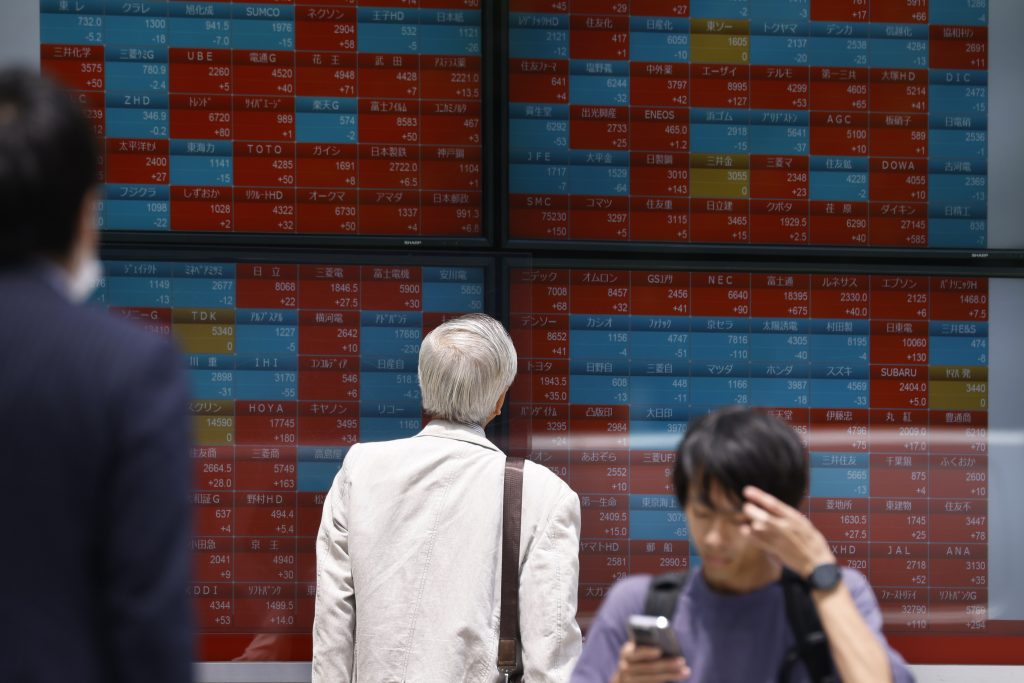
ASIAN stocks edged lower Friday after data showed a slowing US economy and investors weighed legal uncertainties around President Donald Trump’s trade war.
A regional stock gauge dipped 0.2%, led by shares in Japan. Equity-index futures for the S&P 500 fell 0.3%. The gauge trimmed most of its advances Thursday after an appeals court allowed the tariffs to stay in effect. The dollar was steady in early trading while the yen edged higher against the greenback after inflation in Tokyo rose the most in two years.
A federal appeals court offered Trump a temporary reprieve from a ruling threatening to throw out the bulk of his tariff agenda. Adding to concerns, the US economy shrank at the start of the year, restrained by weaker consumer spending and an even bigger impact from trade than initially reported.
“No matter what happens, markets realize that we are facing a long period of uncertainty,” said Win Thin, global head of markets strategy at Brown Brothers Harriman & Co. “Allowing tariffs to remain in place raises risks of stagflation and is both dollar and equity negative.”
The administration celebrated the order from the US Court of Appeals for the Federal Circuit as validating its vow to aggressively challenge a ruling issued Wednesday night by the Court of International Trade blocking sweeping parts of Trump’s tariffs over his use of the International Emergency Economic Powers Act, or IEEPA.
White House officials said they planned to continue defending the legality of their efforts on trade to the US Supreme Court, and said that if they were stymied, Trump would simply pursue the same levies through other authorities.
“The first thought that came to mind when dissecting the rapidly evolving news flow around the tariff saga was that confusion in markets and in the business community must have reached a new extreme,” Chris Weston, head of research at Pepperstone Group, wrote in a note.
Meanwhile, prices in Tokyo jumped the most in two years, in a worrisome sign for Prime Minister Shigeru Ishiba ahead of a summer election. High inflation and strong wages growth means the Bank of Japan is likely to hike in July and December, Kristina Clifton, a senior economist and strategist at Commonwealth Bank of Australia wrote in a note to clients.
“However, for the BOJ, the risks are skewed toward less hikes because of the uncertain global backdrop and negative impacts of US tariffs on the Japanese economy,” Clifton wrote.
Treasuries gained Thursday as traders upped expectations of Federal Reserve rate cuts following weak economic data. Recurring applications for US jobless benefits jumped to the highest level since November 2021, possibly presaging a rise in the unemployment rate this month.
US pending home sales dropped by most since 2022 on higher borrowing costs.
In a face-to-face meeting at the White House, Trump pushed Fed Chair Jerome Powell to lower interest rates, believing he is making a mistake by not cutting borrowing costs.
In corporate news, Dell Technologies Inc. gave a profit outlook for the year that exceeded estimates and said it had seen a significant increase in orders for servers to run AI networks. Salesforce Inc. reported signs of traction in its new AI products, but that wasn’t enough to ease investor anxieties over a long trend of slowing revenue growth. –BLOOMBERG
The post Asian stocks dip on tariff whiplash, futures slip appeared first on The Malaysian Reserve.
